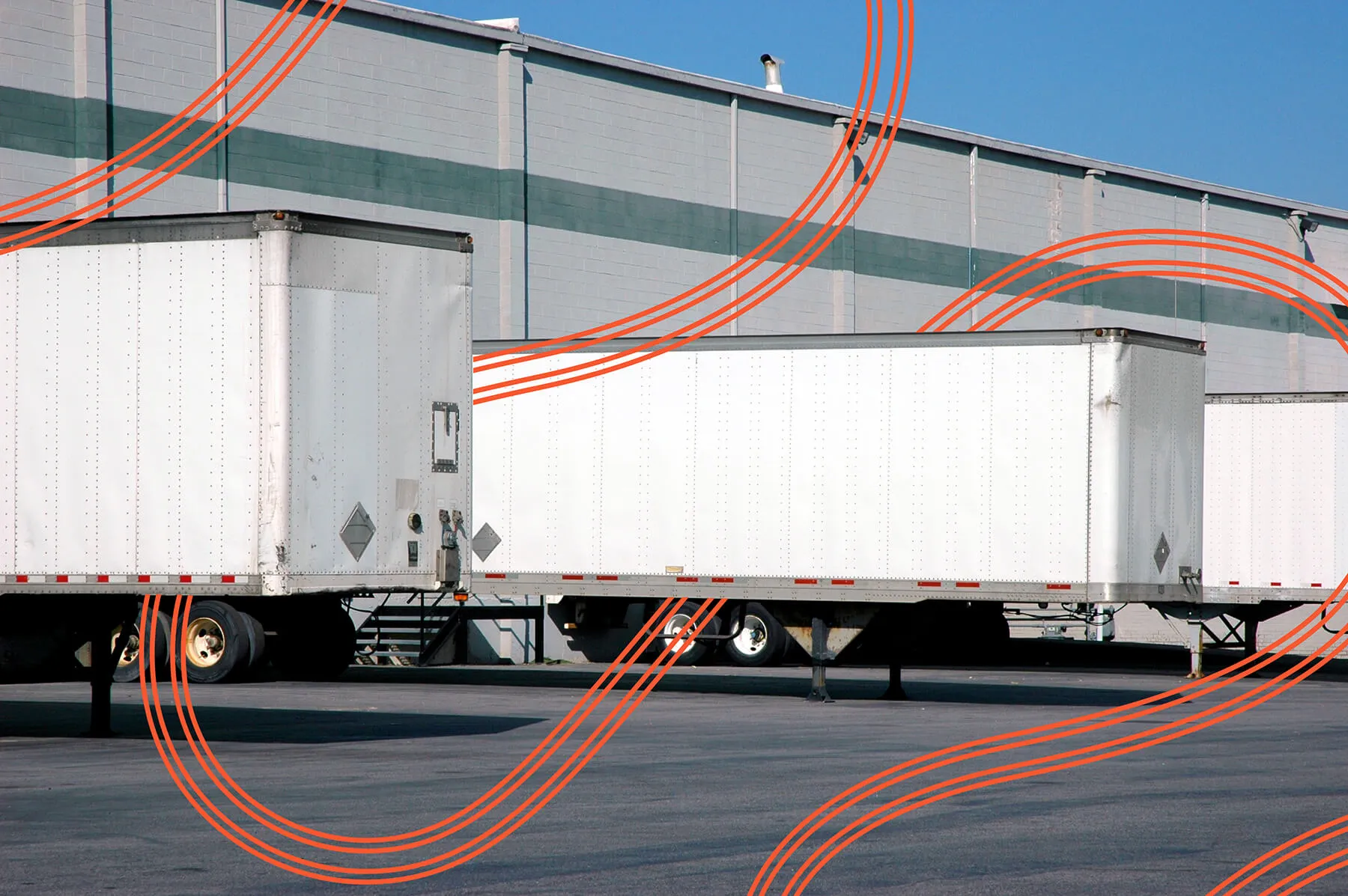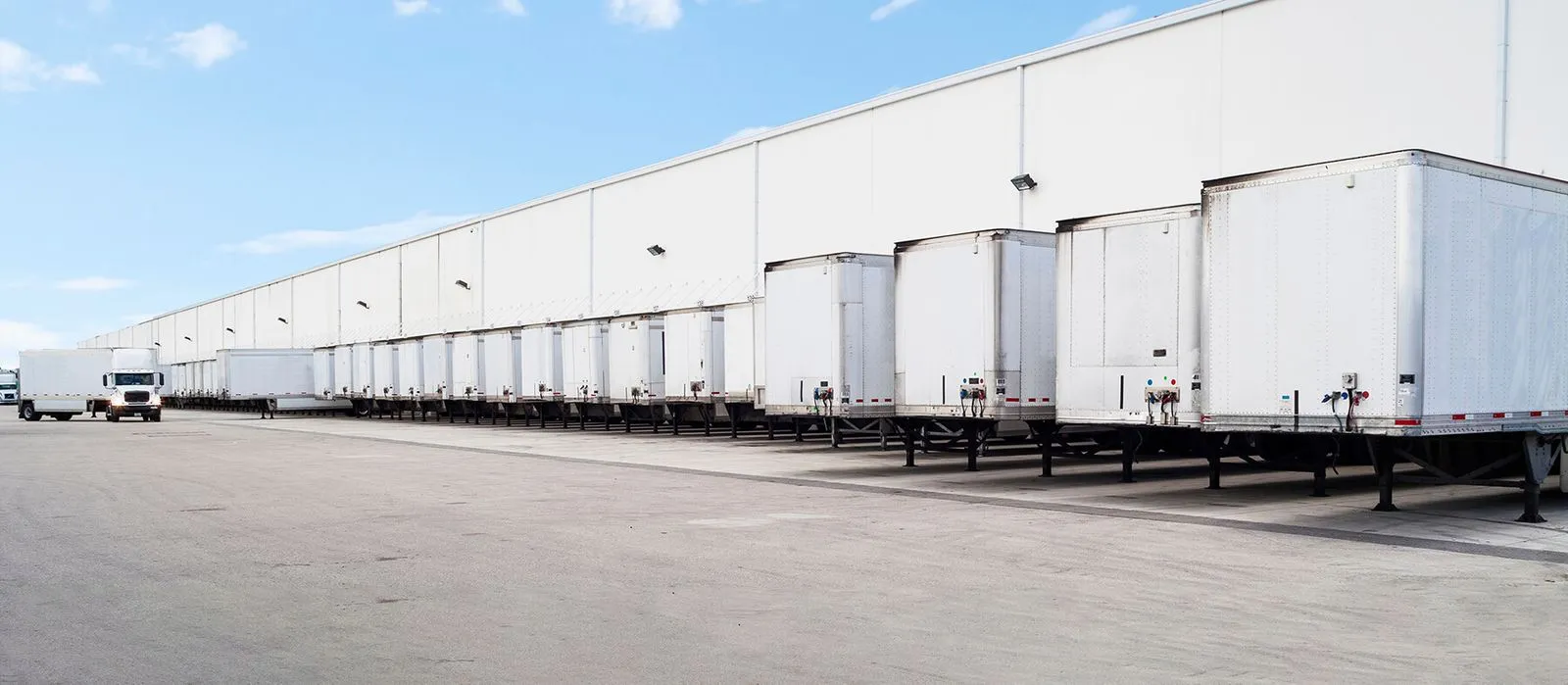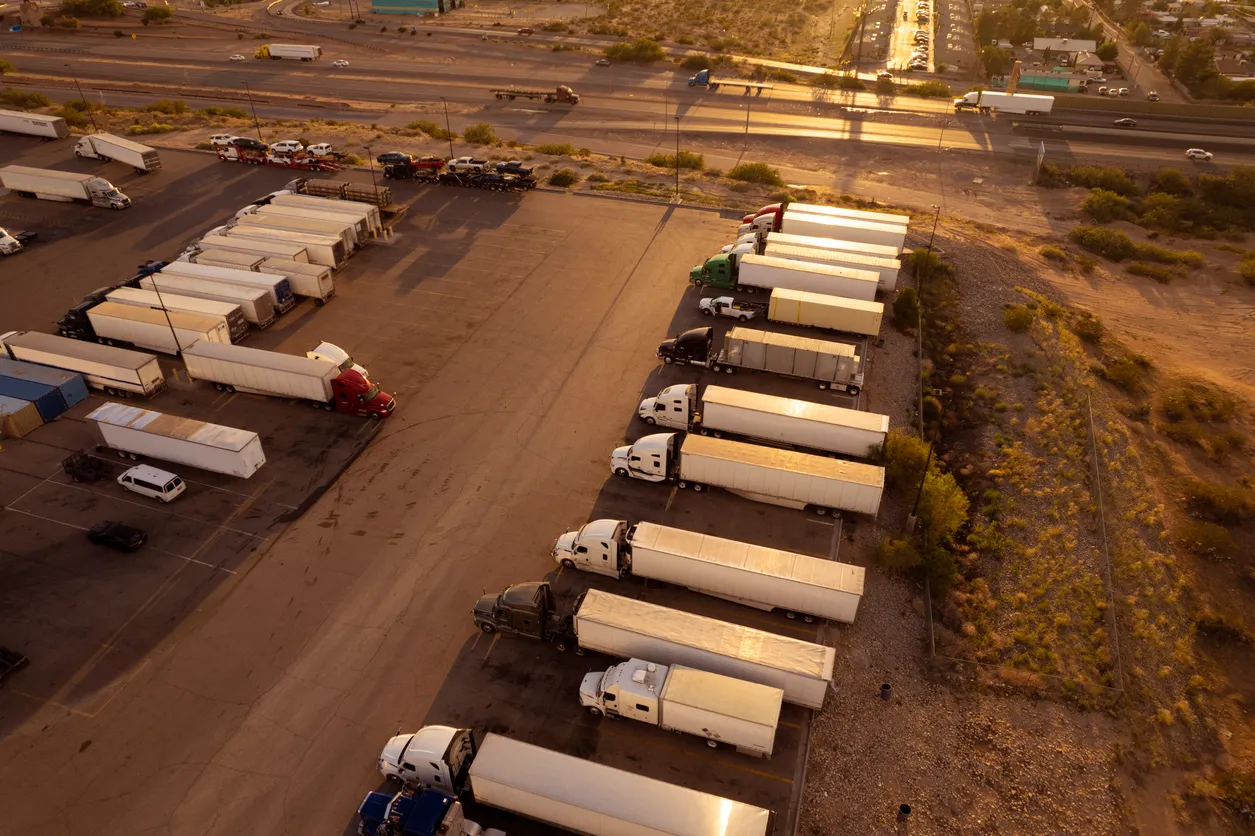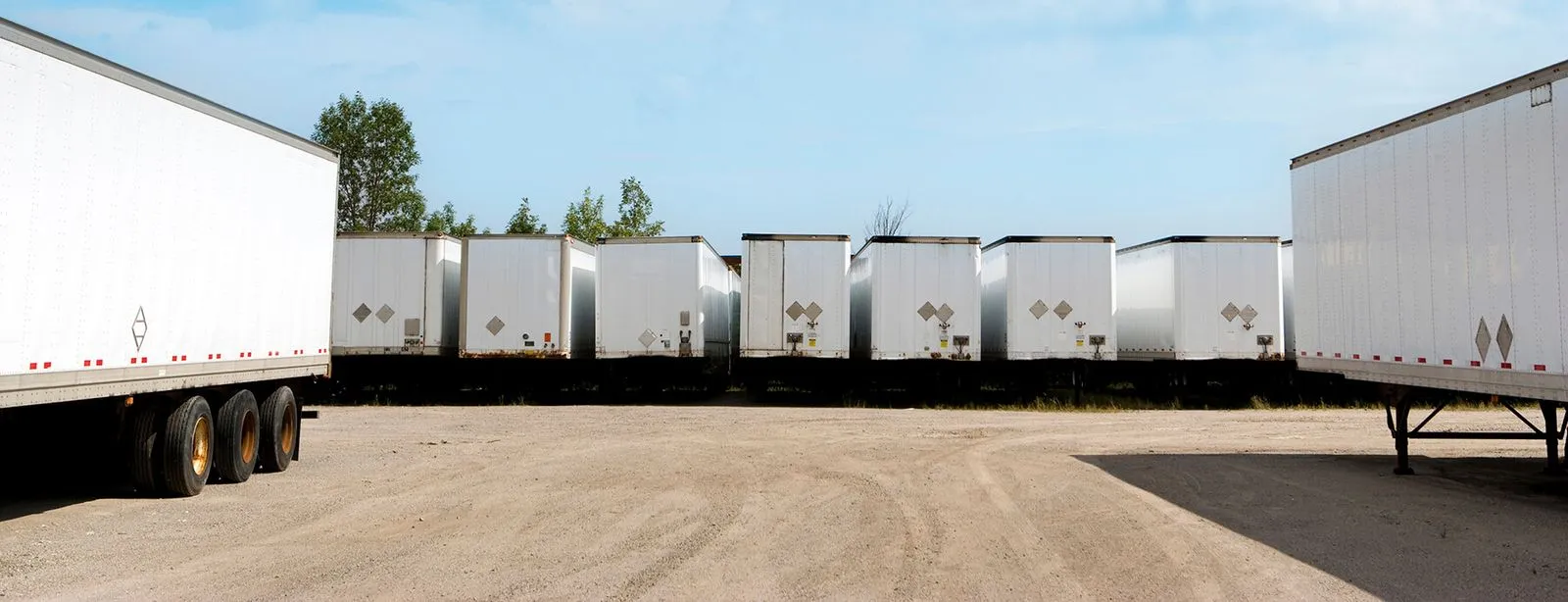
Dry van trailers are a vital component in the secure and efficient transportation of goods. You'll learn why these trailers are work horses for hauling and storing non-temperature sensitive freight. We break down the essentials, from understanding different sizes and models to key maintenance tips that keep them road-ready.
Whether you're considering renting or leasing options or curious about leading manufacturers, this guide lays it all out with tips from our experienced fleet optimization team. Plus, discover features enhancing performance and safety in today's dry vans.
Let’s start exploring how these semi trailers can serve your transportation needs.
Dry van trailers are the backbone of the freight transportation industry, designed to haul goods that don't need a temperature-controlled environment. They're everywhere on our roads, but not everyone knows what makes them so essential. Think of them as the all-purpose workhorse for moving everything from boxed electronics to pallets of raw materials.
These trailer models come in various sizes, with 53 foot dry vans being the most popular due to their versatility and capacity. They efficiently carry a wide range of cargo types making them perfect for logistics operations across North America.
Maintaining these trailers is important for ensuring they stay roadworthy and safe. Regular checks focus on critical parts like brakes, tires, and lighting systems—each playing a significant role in preventing downtime. With proper upkeep, these trailers continue to efficiently haul goods across the US.
When you're looking to rent or lease, understanding the range available helps choose the right commercial rental. Dry vans typically span from 33 feet in length (also known as a pup trailer) and go up to 53 ft trailers, with the 53 foot dry van being especially popular due to its space and flexibility.
The standard dry van semi-trailer serves most transportation needs, featuring sturdy construction and often equipped with swing doors or roll doors for easy loading. Specific cargo demands might call for customized solutions.
To tailor dry van semi-trailers to particular requirements, options can include internal configurations like double decks or installing side skirts which can help save on fuel costs by improving aerodynamics. Other customizable features might involve enhanced security systems or advanced materials such as Duraplate HD walls for added durability against wear and tear.
If your business's transport needs fluctuate widely or you're testing new markets without committing heavily upfront, considering a rental makes sense. Renting dry van trailers offers flexibility while still giving access to models including those specialized configurations not always necessary for every job.

Regular maintenance is required for the safety and longevity of any vehicle and dry vans are included. Key areas like brakes, tires, flooring, and lighting systems need regular checks to prevent downtime and extend trailer life. Understanding dry van trailer maintenance can save you from unexpected issues over the road.
Tires are a vital part of any dry van's operation; they should be inspected regularly for wear and pressure levels to ensure optimal performance and fuel efficiency. Similarly, keeping an eye on brake pads and discs is required for safety. Overlooking these could lead to failures that not only pose serious risks but also incur significant costs and danger on the highways.
Flooring in a dry van takes quite a beating from loading and unloading goods. Regular checks for damage or wear can prevent bigger problems later on. Oak flooring is common and durable, but newer options also include composites and aluminum. Additionally, ensure that your trailer’s lighting system is fully operational —not just for visibility during night hauls but also to stay compliant with traffic laws.
Choosing between renting and leasing dry van trailers hinges on your business's specific needs. Having the option to choose between short- or long-term rentals offer unmatched flexibility for seasonal peaks or unexpected cargo loads. Leases can streamline some costs, but they can bind you to contracts and not allow for any changes to be made based on needs.
Top rental providers boast extensive inventories, ensuring you get exactly what you need when you need it. This helps businesses manage both short-term demands and long-term growth without hassle.
For those looking into dry van trailer rental options, areas with robust transportation networks often have the best availability and rates. Having difficulty finding a trailer inventory with features you need? Consider rental partners that provide trailer pick up and delivery services as part of your business plan.
The decision between renting or leasing ultimately depends on how frequently your business needs storage vans or hauls non-temperature-sensitive goods.
With the COOP by Ryder rental solutions platform, you get convenience and expertise all at your fingertips.
The quality and reliability of these trailer brands make them popular commercial vehicles to rent for storage trailers and hauling freight.
The common thread among these manufacturers is their commitment to excellence and innovation in trailer production. By choosing one of these top brands, owners and renters ensure they get a product designed with both performance and longevity in mind.
COOP has all these brands to offer some of the most diverse range of dry van semi trailers available for rent nationwide, but the top three brands rented out on the COOP platform include, Utility, Wabash, and Hyundai.

Today's dry vans come packed with features that boost both efficiency and safety. For anyone in the transport industry, understanding these can be a game-changer.
First, LED lighting has become standard for its durability and energy efficiency. It not only optimizes cost but also boosts safety by improving visibility during cargo handling, thereby minimizing accident potential. Side skirts and air ride suspension are other innovations worth mentioning. By improving aerodynamics with these features, they contribute significantly to fuel savings—a big plus for any fleet operator looking to cut costs. They could also help when needing semi trailers in states that require CARB compliance.
Suspension mounts have evolved too, offering better stability and smoother rides for cargo. This means less damage to goods in transit, translating into happier clients and fewer insurance claims. Another feature includes advanced locking mechanisms to ensure cargo security from depot to destination without fail.
Dry van trailers have a critical need for resilient, long-lasting flooring that can withstand the wear and tear of loading and unloading cargo in various conditions. The primary flooring options for these trailers are oak, composite, and aluminum. Each with its own set of advantages and disadvantages such as weight distribution and carrying capacity.
A notable mention goes out to design elements like DuraPlate walls which add an extra layer of protection against harsh weather conditions or potential impacts during haulage. Duraplate is a panel constructed of a high-density polyethylene (HDPE) core, bonded between two sheets of pre-coated galvanized steel skins. This is a testament to how modern trailers are built tough yet smartly designed for maximum performance on the road.

A dry van trailer hauls goods that don't need temperature control. It's the go-to for most freight jobs.
"Dry trailer" refers to trailers designed for cargo that doesn't require a chilled or frozen environment. They keep stuff dry.
Dry vans are tops if you're moving non-perishables. Reefers cost more but are must-haves for temperature-sensitive loads.
Dry van trailers are versatile and are used to transport most types of freight, from non-perishable items like electronics to fragile goods like glass. Their security features, like lockable doors, make them appropriate for a wide range of freight that requires protection from theft or damage due to weather conditions.
If you’re a fleet owner or business with idle vehicles, you can list semi trailers on the COOP platform to generate revenue. Owners gain access to a large network of vetted renters with rental insurance coverage included on every rental for peace of mind.
Look for these features when selecting a dry van trailer:
Key points to consider before renting include duration of use, capacity and weight limits, and the condition of the trailer to ensure it meets your specific needs. It's also important to understand the rental company's policies on maintenance, insurance, and roadside assistance. For hassle-free dry van rentals, consider exploring the COOP platform for ultimate control and flexibility to efficiently fulfill transportation needs.
Yes, commercial dry van semi trailers are a great storage solution that helps with warehouse challenges or excess inventory for dry goods.

Start with what you've learned here; let it guide your decisions on size, renting vs. leasing, or even which manufacturer may be suited for your hauling requirements.
Choosing the right semi trailers comes down to your business needs. Standard or specialized vehicles are readily available to rent at competitive rates and with long-term discounts on many trailers found on COOP.
The COOP platform is a powerful tool that provides rental solutions made for improving productivity and your bottom line one trailer at a time.
To learn more about optimizing your fleet or if you're looking for cutting-edge transportation solutions, download this COOP demo video.